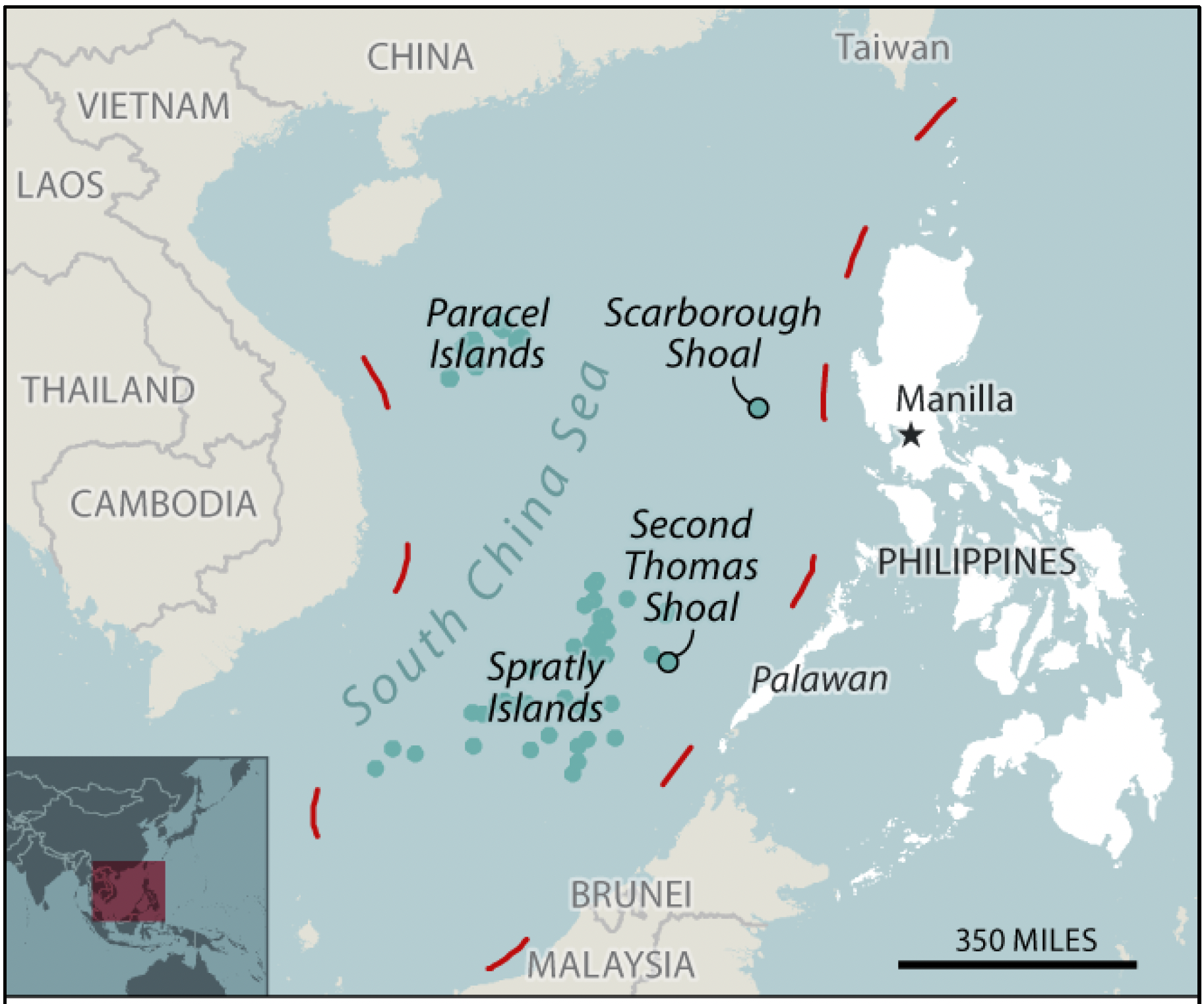South China Sea Tensions Rise: China Pressures Philippines On Missile Deployment

Table of Contents
China's Assertions and Actions in the South China Sea
Historical Claims and the Nine-Dash Line
China's claims in the South China Sea are rooted in its historical assertion of sovereignty over vast swathes of the region, often visualized through the controversial nine-dash line. This line, which encompasses a significant portion of the South China Sea, is not recognized by international law and overlaps with the exclusive economic zones (EEZs) of several neighboring countries, including the Philippines, Vietnam, Malaysia, Brunei, and Taiwan. This ambiguity fuels the ongoing maritime disputes and contributes to the current tensions.
- Island Building: China has engaged in extensive land reclamation and artificial island construction, transforming reefs and shoals into military bases equipped with runways, harbors, and advanced weaponry. This significantly alters the strategic landscape and strengthens China's military presence.
- Naval Patrols: The Chinese navy routinely conducts assertive naval patrols within the disputed waters, often leading to standoffs and near-miss incidents with other claimant states' vessels. These patrols are perceived as a demonstration of China's control and a challenge to freedom of navigation.
- Fishing Disputes: Disputes over fishing rights are a frequent source of friction. China's coast guard often harasses and detains fishing vessels from other countries operating within waters claimed by China, further escalating tensions and undermining regional cooperation.
China's Response to Philippine Missile Deployment
China vehemently opposes the Philippines' plan to deploy missiles on its islands in the South China Sea, viewing it as a provocation and a threat to its own security interests. Official statements from Beijing have characterized the move as an escalation of tensions and a destabilizing factor in the region. From China's perspective, the missile deployment undermines its claims to sovereignty and could potentially be used to target Chinese assets.
- Diplomatic Pressure: China has employed various diplomatic pressure tactics, including issuing strong warnings, making public statements condemning the move, and hinting at potential economic repercussions for the Philippines.
- Military Posturing: Increased naval activity and military exercises near the Philippine-controlled islands could be employed to signal China's displeasure and deter further actions by the Philippines.
- Economic Leverage: China’s significant economic influence over the Philippines provides leverage, and threats of reduced trade or investment could potentially sway the Philippine government's decision.
The Philippines' Stance and Strategic Considerations
Justification for Missile Deployment
The Philippines justifies its missile deployment as a crucial measure for self-defense and the protection of its sovereign territory. Facing increasing assertiveness from China, Manila argues that the deployment is necessary to deter further aggression and safeguard its interests in the disputed waters. This is a response to what it perceives as a growing threat to its national security.
- Deterrence: The missiles are intended to deter potential attacks on Philippine-controlled islands and assets, providing a credible defense capability against any future incursions.
- Territorial Integrity: The deployment is also aimed at underscoring the Philippines' commitment to defending its territorial integrity in the face of China's expansive claims.
- Alliances and Support: The Philippines may seek closer military cooperation with its allies, such as the United States, to bolster its defense capabilities and deter Chinese aggression. This might involve joint military exercises or the provision of advanced military equipment.
Balancing Relations with China
The Philippines faces the complex challenge of balancing its need to defend its sovereign rights with its desire to maintain strong economic and political ties with China. China is a major trading partner, and the Philippines seeks to benefit from economic cooperation while simultaneously safeguarding its security. This delicate balancing act requires nuanced diplomacy and careful consideration of the potential repercussions.
- Economic Interdependence: The economic consequences of strained relations with China are significant, making it crucial for the Philippines to manage the situation carefully to avoid jeopardizing its economic interests.
- Regional Cooperation: The Philippines plays an active role in ASEAN and seeks to foster regional cooperation, even amidst the ongoing tensions in the South China Sea.
- Potential for Escalation: A misstep or miscalculation could lead to a further escalation of tensions, potentially impacting bilateral relations and regional stability.
Regional and International Implications of the Dispute
Impact on Regional Stability
The escalating tensions in the South China Sea pose a significant risk to regional stability. The potential for miscalculation or accidental conflict is high, particularly given the increasing militarization of the region. The involvement of other regional powers, including the US and other ASEAN members, further complicates the situation.
- Trade Routes: The South China Sea is a crucial waterway for global trade, and any disruption caused by conflict could have far-reaching economic consequences.
- Freedom of Navigation: China's actions challenge the principle of freedom of navigation, a cornerstone of international law and crucial for maintaining the open and accessible nature of the sea lanes.
- Regional Security Alliances: The dispute strengthens the impetus for regional security alliances and could lead to increased military spending and arms races.
International Law and the South China Sea Arbitration
The 2016 arbitral tribunal ruling, which invalidated China's expansive nine-dash line claims, holds significant legal weight. While China refuses to recognize the ruling, it represents a crucial aspect of international law relevant to the dispute. The international community largely supports the ruling, emphasizing the importance of respecting international law and the UN Convention on the Law of the Sea (UNCLOS).
- UNCLOS and International Law: The UNCLOS provides the legal framework for maritime delimitation and the management of maritime resources. Adherence to UNCLOS is essential for maintaining stability and order in the South China Sea.
- International Pressure: The international community may increase pressure on China to comply with international law and engage in peaceful conflict resolution. This pressure can take the form of diplomatic statements, sanctions, or other measures.
- Role of International Bodies: International bodies, such as the UN and ASEAN, play a critical role in facilitating dialogue, promoting peaceful settlement, and enforcing international norms in the South China Sea.
Conclusion
The escalating tensions between China and the Philippines over missile deployment in the South China Sea highlight the complexities of this long-standing dispute. China's assertive actions, fueled by its historical claims and strategic interests, clash with the Philippines' determination to defend its sovereign territory. The potential consequences for regional stability, international law, and the broader geopolitical landscape are significant. The situation demands urgent diplomatic efforts to de-escalate tensions and find a peaceful resolution based on respect for international law. We urge readers to stay informed about the evolving South China Sea tensions, research further into the China-Philippines dispute and South China Sea military deployments, and engage in discussions about peaceful conflict resolution. Understanding these dynamics is critical for addressing this crucial geopolitical challenge.

Featured Posts
-
 Apples Llm Siri A Comeback Strategy
May 20, 2025
Apples Llm Siri A Comeback Strategy
May 20, 2025 -
 Is Amorims Latest Forward Signing A Success For Man Utd
May 20, 2025
Is Amorims Latest Forward Signing A Success For Man Utd
May 20, 2025 -
 Family Struck By Train Two Dead Childrens Fate Unknown
May 20, 2025
Family Struck By Train Two Dead Childrens Fate Unknown
May 20, 2025 -
 Bbc Launches Ai Powered Agatha Christie Writing Classes
May 20, 2025
Bbc Launches Ai Powered Agatha Christie Writing Classes
May 20, 2025 -
 The Evolution Of Agatha Christies Poirot From Novels To Screen
May 20, 2025
The Evolution Of Agatha Christies Poirot From Novels To Screen
May 20, 2025
